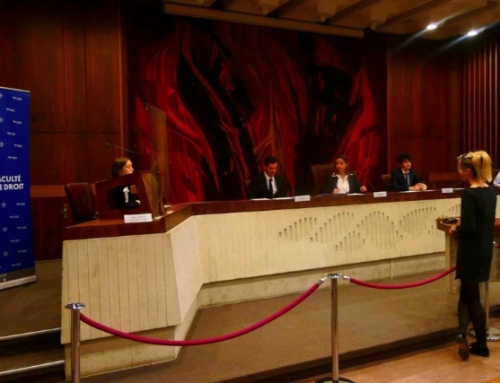Knowledge and skills have always been assessed. At a time when many French students are still preparing for their end-of-year exams, after a teaching year severely disrupted by covid-19, what means are being used and what new perspectives are opening up for the various players?
To begin this discussion, let’s recall that in the 17th century, the dictionary indicated that an examination was a search for accuracy, carried out as completely and meticulously as possible :
“EXAMEN, se dit aussi de l’espreuve, de la capacité de celuy qu’il faut promouvoir aux Ordres, ou recevoir en quelque charge, qui aspirpire à quelques degrez dans les Escoles”, Furetière’s Universal Dictionary – 1690.
What’s clear to the reader here is that examination is directly linked to the term “test”. A test that proves the examinee’s abilities, but today symbolizes the difficulty, and sometimes harshness, of what educational establishments offer their students. While passing exams should no longer be an ordeal, the fact remains that the student population is sensitive to the conditions under which the authorities control the acquisition of the knowledge they provide. The extremely complicated period to which the students have been subjected, for example, should encourage them to take a more benevolent view of their future success in the assessments.
However, the switch to distance learning for courses was naturally followed by a switch to distance learning for assessments. This raised a host of questions, some of which remain unanswered. “How can we trust the students?” but also “how can we trust the technology deployed?” are the questions that create the most conversations and thus provoke lively reactions at all levels. At the Catholic University of Louvain, for example, we learn that “students can’t take it anymore”, given the problems associated with using a digital platform for their exams [1]. Elsewhere in Switzerland, questions are being asked about the desire to monitor learners’ actions beyond the simple control of their identity: “This surveillance goes much too far,” exclaims Hugo Molineaux, permanent secretary of the University Conference of Student Associations. The data protection officer himself acknowledged that this was akin to video surveillance last spring.” It’s clear that trust is essential in the complex situation we all face.
So what’s the state of play at the end of this academic year?
“Overall, the timetable has […] been maintained, with the 2nd semester midterms scheduled for May”, declares Guillaume Gellé, vice-president of the Conference of University Presidents.
As for the choice of methods, establishments remain free to organize their mid-term exams either face-to-face or remotely. From May 3 onwards, mid-term exams will be organized “in accordance with the knowledge control methods validated by the establishments: face-to-face, distance learning or via the submission of a report. For the first semester session, 30 to 40% of exams took place face-to-face. They will be slightly more numerous in the second semester“, adds Frédérique Vidal, the French Minister of Higher Education. So everything seems to be in place.
But beyond these organizational issues, there remains the question of the technological means used to deliver these remote exams. While many universities have been using their LMS (most often Moodle) to organize exams since May 2020, a number of them have also been looking for more efficient technological solutions offering a greater wealth of documentation.
What are the new tools for assessing knowledge?
For Sabine Bottin-Rousseau, Director of ODL at Sorbonne University, “the method I tested involved a subject displayed on the screen, but a paper essay. Students then scan their assignment with their smartphone and upload it to the site. During the test, they film themselves with their webcam, so as to be supervised”.
For his part, Laurent Champaney, General Manager of the École Nationale Supérieure des Arts et Métiers (ENSAM), was reassuring, pointing out that “as early as autumn 2019, we had already begun deploying distance learning platforms such as Microsoft Teams. We’ve tried out others, such as the Wooclap application. Teachers, with their groups of students, had therefore already become accustomed to ‘juggling’ different tools in order to re-scenarize courses by conducting, for example, polls and MCQs to energize and put more zest into teaching.”
And yet, apart from the use of online quizzes, video-conferencing and the ubiquitous MCQs, little or nothing seems to challenge the exam mark as the main means of assessment.
While respecting fair conditions for all is obviously a challenge for all universities, whether they have opted for distance learning mid-term exams or remained with traditional methods guaranteeing exemplary health safety, we note that progress in terms of assessment methods remains limited.
In addition to the fact that the efforts of digital solutions publishers seem to focus too much on securing and monitoring the exam, it’s the rigidity of the assessment itself that is the subject of debate today. Indeed, as early as last year, a government order dated March 27, 2020 encouraged establishments to adapt. The text even specified that
“These adaptations may relate to their nature, number, content, coefficient or conditions of organization, which may in particular be carried out dematerially, while respecting the principle of equal treatment of candidates”.
And if the issue of hypersurveillance is at stake, we need to look more broadly at examination methods and the transition from knowledge testing to skills assessment. In the same way that delivering a course remotely is not the dematerialized transposition of a face-to-face course, a distance exam needs to be conceived differently. Of course, the question of verifying the candidate’s identity remains a central issue, and proctoring solutions are interesting to consider in this respect.
But at a time when we’re talking more and more about skills-based assessment, why should we continue to ask students to answer course questions, and why shouldn’t we put them in situations where they can solve concrete problems or call on their analytical skills and creativity? Why not evaluate only concrete projects, developed under the supervision of teachers and assessed at the end of the cycle? This is just one example, but it shows that while technology can help us cope with the number and acceleration of learning, we also need to innovate by assessing the ability to “learn how to learn”.
In other words, does the future lie in assessing our ability to evolve?
[1] https://www.rtl.be/info/belgique/societe/-les-etudiants-n-en-peuvent-plus-c-est-un-fiasco-l-uclouvain-renonce-finalement-a-son-logiciel-d-examens-a-distance-1220832.aspx
Découvrez ci-dessous un numéro #Univ4Good dans lequel nous avons parlé d’examens à distance, de logiciels de proctoring et de la plateforme @Discord !
Check out a #Univ4Good issue below in which we talked about distance exams, proctoring software and the @Discord platform!






